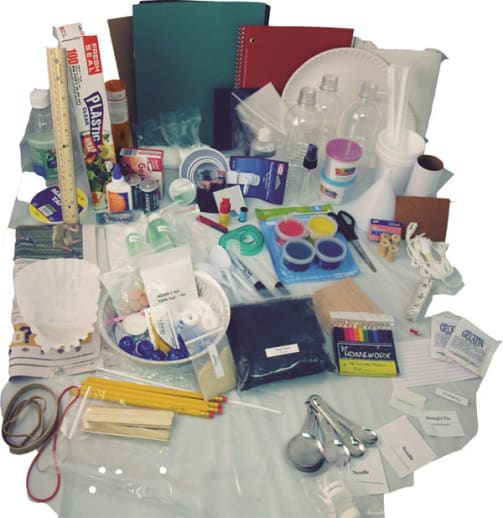The Science in the Ancient World Lab Kit includes aluminum foil, antacid tablets, baking soda, bar magnet, bendable straw, birthday candle, black construction paper, black marker, butterscotch candies, candle, cardboard, cardboard tube, circular pie pan, clay dough, coffee filter, colored candies, colored pencil, construction paper, craft sticks, dish soap, dropper pipette, finger paint, flashlight, flavored gelatin, green food coloring, funnel, glue, golf ball, honey packet, index card, large paper plate, rubber bands, large straw, mint Lifesavers, magnifier, magnifying mirror, marbles, masking tape, measuring cups and spoons, measuring tape, mint candy, mirrors, 3-inch nail, needle, newspaper page, notebook, paper towels, pen, pencil, plastic bag, plastic cling wrap, plastic tub, plastic water bottle, pushpin, red cinnamon candies, rubbing alcohol, 12-inch ruler, salt, sandpaper, scissors, small board, small nail, small paper plate, spoon, spray bottle, stopwatch, straight pin, Styrofoam cup, super glue, clear tape, thread, thumbtacks, toothpick, top soil, unflavored gelatin, vinegar, wax paper, white cotton string, white paper, wooden matches, wooden spools, yeast, and Ziploc bags.
Some items are in numbered bags with a list of the contents in that bag - this aids locating. Household items will need to be supplied and are listed by lesson on the enclosed equipment list.
1
A lab kit designed for Science in the Ancient World. Although many of the items may be easy to find at home or stores close by, this kit makes your Science course an enjoyable stress-free experience. With each lessonindividually bagged and labeled, it allows students more time to apply knowledge and understanding towards the course, and less time gathering all the supplies. With this kit, students will be able to learn about length andsound, how to decompose hydrogen peroxide, learn about copper and iron, learn about the digestive system, a sinking gas, and so much more!

